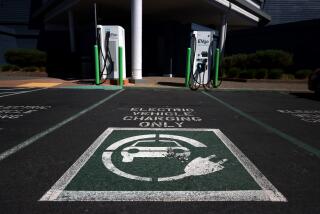Driving Toward Zero Emissions
Driving solo, you zip down the diamond lane to a free, preferred parking slot at work; your car is fueled for free while you’re at your desk, and you get a big discount on annual car registration. For a long weekend trip, you use one of the gasoline-car rental coupons that came with your short-range vehicle.
These are among the ideas being considered or implemented by government and private companies to encourage purchases of electric cars. The incentives will add up, supporters say, overcoming initial consumer resistance.
However, if the California Air Resources Board had listened only to auto makers at its hearings Thursday and Friday in Los Angeles, it would have concluded that its 1998 deadline for requiring 2% of each company’s sales to be zero-emission vehicles was hopeless. Battery technology lags, the auto makers said. No one will buy them. The deadline will hurt business.
Luckily, the board’s own staff, battery manufacturers and environmental groups had another message: The deadline can be met and the technology is in the pipeline. The board showed no indication to bow to auto maker proposals to delay the deadline, appoint an outside review board or review the zero-emission mandate every six months. Board members wisely understood that each of the proposals would kill investment by introducing uncertainty and betray other states that are following our lead. All the while, German, Italian and Japanese companies would be readying their own electrics for market.
As Malcolm Currie, former chairman of Hughes Aircraft and co-chairman of the Project California high-tech coalition, told the hearings: “Tough goals with incentives in the end do drive technological innovation. An electric vehicle revolution is clearly being born.” We just have to make sure its birth certificate says “California.”






